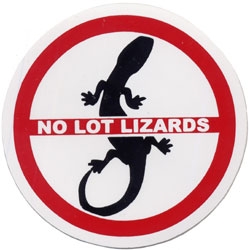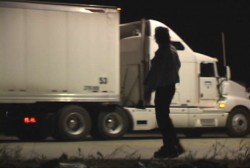The incredible double-messaging of US prostitution law finds perfect expression in two recent stories from the state of Oklahoma. In one, everyone agrees that prostitutes are a nuisance and a judge forces the owners of a rest stop to post signs, fix a fence, provide cctv and hire guards to arrest sex workers. (The name lot lizards presumably refers to how baking-hot people get hanging around on black asphalt in the sun.) In the second, truckers are admonished to understand that sex workers are victims of trafficking who are passively transported and need rescuing, the focus being, of course, on adolescents (who, we learned the other day, are mostly running away from home.)
One would almost think these stories are describing two separate groups, one that’s bad and one that’s good, but that’s not true, of course. All the people involved are selling sex in truckers’ rest stops. Some truckers are buying sex. Some owners of truck stops are willing for this trade to go on. For people who don’t want it to go on, however, there are two choices: blame the sex workers or rescue the victims. Very confusing.
Truck stop ordered to clean up prostitute problems
Jesse Wells, 8 April 2011, KFOR
Oklahoma City — An Oklahoma County judge forces a metro truck stop to clean up it’s act. . . “The Five Star was symbolic of the worst problem of prostitution in the city,” video vigilante Brian Bates said. For a long time, Oklahoma City police negotiated with the truck stop owners to curtail the illegal activity but got no results. That’s when they took the issue to court. “Prostitution had been running rampant at that business and the owner wasn’t doing anything to stop it,” explains Oklahoma City Police MSgt. Gary Knight.
The court order will now force the business to post additional “no trespassing” and “no soliciting” signs, repair and enhance the fencing, provide continuous video surveillance and hire security guards who can arrest prostitutes day or night. . .
Oklahoma truckers learn how to stop human trafficking
By Kristi Eaton, 25 March 2011, Associated Press/TheTrucker.com
Oklahoma City — It’s been nearly 30 years, but Mark Brown still remembers the face of the teenage girl who approached him at a truck stop in California. He’d just finished a long day of driving across the country when the girl, who wasn’t more than 15 or 16 years old, knocked on his window and asked if he wanted a date. He said he ignored her and let her proceed down the row of trucks, knocking on windows trying to sell her body for money. “I still regret that decision to this day,” he said. “I should have helped her.”
Brown now uses his position as assistant director of Driving Instruction at Central Tech in Drumright to teach new drivers about what they can do combat the industry’s hidden secret. He passes out wallet cards with tips and information to students and is going to distribute a training video to other schools across the country about human trafficking. And it’s all because of a partnership with Truckers Against Trafficking, an initiative that hopes to educate and raise awareness about domestic sex trafficking along the nation’s highways. The program by the anti-human trafficking organization Chapter 61 Ministries specifically targets young girls and boys who it says are transported across the country to prostitute at truck stops and plazas.
Lyn Thompson, who started Chapter 61 Ministries in 2007 with her four daughters and a family friend, said she developed the idea for Truckers Against Trafficking after learning the important role gas station attendants play in identifying victims of human trafficking. Taking it one step further, she began focusing on truck drivers. “Traffickers have to transport their victims, whether by plane, train, ship, bus, car or truck,” said Thompson, a Tulsa resident who acts as a national coordinator for the initiative. “So, all the transportation industries are first-line defenders against this crime.”
The girls and boys who work the trucks stops and plazas are called “lot lizards,” said Kendis Paris, a national coordinator for TAT based in Denver. She said the group is focusing on kids under the age of 18 because by law, they are victims of human trafficking if forced into the sex trade. “I honestly don’t think anybody wakes up and says, ‘I want to sell my body,’ but the kids really have no choice,” she said, adding that many are runaways who have been coerced into prostitution. By attending trucking industry events and meetings, Paris hopes to get the wallet cards in to the hands of every trucker in America. Trucker drivers can call a hotline number listed to report a crime or ask questions if they are unsure something illegal is taking place.
“The issue is difficult to police or get control of, so that’s why TAT’s effort is so important, because we feel like if we can educate the professional truck driver, nine out of 10 of them are going to want to get these people arrested who are doing this stuff,” said truck stop plaza owner Sam Smith, who has hung up TAT posters and distributed wallet cards to drivers at his Nashville, Tenn., store.



For those who may not know, Brian Bates,the self-styled “video vigilante” mentioned in the first story, is a man who has for many years spent most of his free time obsessively videotaping streetwalkers and their clients and giving the videotapes to police: http://maggiemcneill.wordpress.com/2011/01/31/january-q-a/ (third question).
thanks for solving that little cultural mystery, maggie!
Moralistic campaigns against “lot lizards” won’t change the social realities that create demand for sex work services among American truck drivers.
Since the collapse of the Freight Division of the International Brotherhood of Teamsters (the union that used to represent almost all long distance truckers in America) in the late 1970’s, the resultant deunionization of 90% of the longhaul trucking industry and the collapse of wage rates in the industry, truckers have had to drive longer hours and more days in a row just to make a living.
Broken down to hourly wages, most non union truckers make close to minimum wage – to survive economically, they have to drive more and more hours and they often spend 20 or 30 days in a row on the road.
Many of these drivers find themselves wanting to have sex during these long stretches of time away from home. Also, since many of these truckers live in social conservative rural Southern or Midwestern cities, the gay drivers often are married to women and live in the closet at home and only get to have the kind of sex they want to have (that is, sex with men) when they are on the road (yes there are male lot lizards – and transgendered women lot lizards too – especially around the truck terminals here in the New York City/Northern New Jersey area!)
In other words, the lot lizards wouldn’t be working the lots if they wasn’t a demand!
Now, we can decriminalize sex work, let the drivers and the lizards do their thing and provide resources and education to both truckers and sex workers about safer sex on the road – or we can keep on with the moralistic rescue campaigns and the persecution of truckstop sex workers.
Which seems more productive?
gregory, thank you for the information about truckers’ lives, which one rarely hears. and of course it is yet another unhelpful aspect of the trafficking story to be only interested in young girls, and then adult women and not at all in other gender identities.